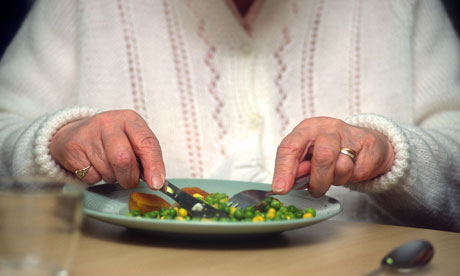
The NHS has been addressing the growing problem of older people becoming malnourished while in hospital, either because they don't get food they can eat or the help they need to eat it. However, malnutrition among older people in care has proved to be a more difficult problem to tackle as many residential care homes are small family-run establishments. The Food First project, led by two registered dietitians based at Bedfordshire primary care trust (PCT), now part of South Essex partnership trust (SEPT), aims to address the root causes of the condition.
Cathy Forbes, an advanced specialist dietitian and Food First project lead, says: "Over the last few years, the medicines management team at the PCT realised that spending on oral nutritional supplements [for older people], which are mainly prescribed by GPs, was increasing steeply, and we were looking for ways to control costs. We realised that the best way to reduce the need for oral supplements was to ensure that care homes were providing a high standard of dietary intake for residents. We also quickly understood that in only tackling the issues around inappropriate prescribing, we were just 'sticking a plaster' over the problem of malnutrition and not addressing the real issues."
Forbes helped to set up a scheme to support staff working with vulnerable people across health and social care. It includes drawing up individual nutritional care plans for people in care homes and allowing staff to change a person's diet.
"Obviously, most independent [care] providers want their residents to eat good food … and they realise that if residents are eating better food, they're more alert, happier and will stay in the care home for longer, for which they get paid, so there's a financial incentive too," says Forbes.
Nympha Castillo, a senior carer at the Little Bramingham Farm care home in Luton, which has 24 residents, says it has benefited hugely from working with the Food First team. "We have a number of residents who are regarded as at high risk from malnutrition, and in the past we've used oral supplements with these residents," she says. "But since we've redesigned our menus to give better nutritional content, we've had to use these much less. Our residents also seem much more alert and enjoy their food more." The home encourages families of residents to come and eat with them as this can encourage elderly people to eat more.
As part of the programme, the Food First team has a regular system of inspections of care homes' food standards. After initially working with the managers and caterers in homes on menus and nutritional requirements for residents, they visit homes on a weekly or fortnightly basis to check that standards are being maintained and to advise on solving any problems. The homes are given a certificate of food nutritional quality, which they can display publicly, and – in extreme cases – if standards fall, the team can withdraw the certificate.
The project has been funded by medicines management teams in Luton and Central Bedfordshire PCTs, which oversee prescribing in the residential and nursing home sectors. The initial start-up costs are offset by a long-term reduction in prescribing costs for nutritional products. Already in 2011-12 SEPT says it has saved £200,000.
The programme, which was set up in 2009, has now been extended to three PCT areas. As a result of working with the team, 95% of care homes in the three areas have improved the nutritional standards of their food and have seen improvements in residents' health. Similar schemes are now also running in other areas of England, including Darlington, County Durham and Leicester.
Meanwhile, the British Dietetic Association (BDA), the professional body for registered dietitians, has launched its own campaign, Mind the Hunger Gap, to make health and social care professionals more aware of the problem of malnutrition. "We want to co-ordinate with other organisations in tackling the problem and we are working closely with Carers UK on ways to improve nutrition for vulnerable people," says Andy Burman, BDA chief executive. "Around 20% to 30% of our members work in the community and they have seen a sharp rise in the number of people suffering from malnutrition in recent years.
"We can demonstrate to our colleagues in social care that we can tackle these issues cost-effectively, and our campaign is crucial, especially at a time when the NHS and councils are having to save money."

